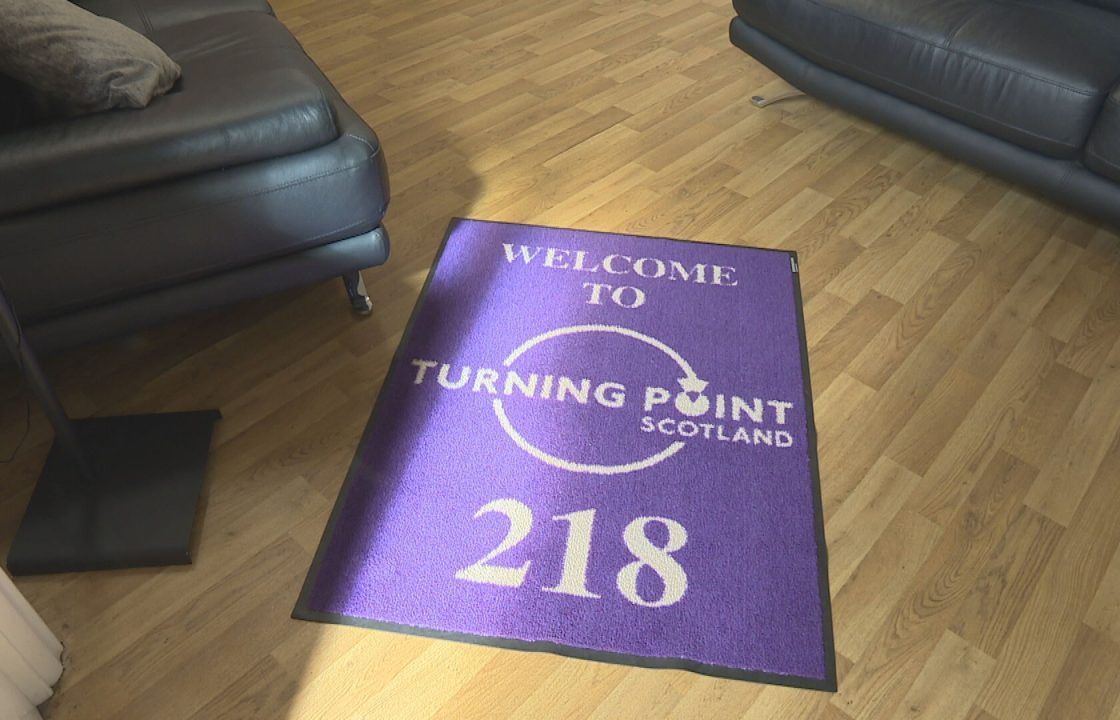Emma* spent six months being helped by staff at Turning Point 218 in Glasgow.
The 46-year-old now works for the service, which helps support female offenders to rebuild their lives after drug and alcohol use.
But it is facing £850,000 in cuts and imminent closure – a move that Emma says will be detrimental to vulnerable women looking to continue their recovery.
“Women need it, there’s no other place like this,” she told STV News.
“There’s 12 people on the waiting list just now – one person leaves, another comes in and that says it all, people constantly wanting in, people desperate, so it’s going to be more people homeless or more people in prison, which costs a lot more money, or dead.
“This is lifesaving in here, this place helps people get their families back, and back in contact with their children. It was a new way of life for me in here.
“The demand is there, they’re (Glasgow Health and Social Care Partnership) are just putting money into the wrong things.”
Emma says she was drinking every day and fighting for survival when she encountered Turning Point, which has helped many women referred for support over almost two decades.
“I was in the cells of the sheriff court and a worker came and asked if anyone was waiting to go into 218,” she said. “I shouted on her and I got in as a high priority as my life was such a mess out here. This was the best thing I ever did as it kickstarted my recovery.”
The service, which is provided by Turning Point Scotland and the Glasgow Addiction Service, helps address issues with substance use, physical and mental health and other social needs including housing and childcare initiatives that female offenders face.
It provides an alternative to custody for women in the justice system and has been working with the health board, Glasgow courts and the city council since 2005.
The service was originally a 12-bed residential unit and day programme however, a review by the Glasgow Health and Social Care Partnership recently included reducing the bed capacity from 12 to eight women.
The 218 Service has a combined budget of £1.5m – made up of £300,000 from Glasgow City Council and £1.2m from the Scottish Government.
Glasgow City Council withdrew £292,000 of funding in March 2023, and it has now been confirmed that the Scottish Government has further reduced funding to the service by £550,000.
Managers claim they’ve been blindsided by a decision to slash the funding in half, which has left them with an unworkable budget. But officials say they need to ensure value for money.
Trade union Unite, which represents the majority of the 30 workers based in Glasgow city centre, branded the decision to cut funding to the programme as “scandalous”.
Unite general secretary Sharon Graham said: “If there was ever a time to invest money into a service like this to help some of the city’s most vulnerable people it is now. Unite will back our members who are providing transformative and life-changing work all the way.”
The decision to withdraw the funding for the 218 Service comes as figures, published by National Records of Scotland, recently revealed that there were 1,276 alcohol-specific deaths registered in Scotland in 2022 – an increase of 2% (31) on 2021.
Female deaths rose by 31 to 440, with male deaths unchanged at 836. There are 4.3 times as many deaths from these causes in the most deprived communities as there are in the least deprived communities.
The increase in deaths in Glasgow was also bigger than across the nation. In Glasgow, there were 202 alcohol-specific deaths in 2022 – up from 188 the year before, constituting a rise of 7.5%. It is the highest number of deaths since 2011.
The calls for a reversal of cuts have been also been backed by the national Turning Point organisation who say they are “dismayed” by the decision.
Director of operations Patrick Mackay said: “Turning Point Scotland shares Unites extreme concern for the future of the innovative 218 service.
“Our 218 service delivers a comprehensive programme of support, as an alternative to a custodial sentence. The service aims to address the root causes of women’s offending, by offering a therapeutic, trauma informed programme for women to actively engage in their own personal recovery journey. Each woman is allocated a member of our highly qualified team.”
A Scottish Government spokesperson said: “This year £113m will be made available to Alcohol and Drugs Partnerships (ADPs) to support local and national initiatives ensuring that local services can respond to local needs. It is for ADPs to manage their own budgets and allocate financial resources. This year’s funding awards have been made toto ADPs, including for stabilisation, and they are now responsible for its final distribution.
“As we set out in the Cross Government Approach paper, we have committed £3m a year to ADPs to develop and implement stabilisation services. This funding is to develop and implement stabilisation services and work towards aligning crisis, stabilisation, detox and rehabilitation to reflect the full range of recovery pathways required.
A spokeswoman for Glasgow Health and Social Care Partnership said: “Following a joint service review with Turning Point it was agreed the number of beds could be reduced in line with demand.
“This review was carried out earlier in the year and we have worked with Turning Point since then to reduce the number of beds from 12 to eight.”
Organisations had until Monday to submit bids to run a new residential service on a reduced budget. It’s not yet known if any offers were made and the future of Turning Point 218 remains in doubt
Follow STV News on WhatsApp
Scan the QR code on your mobile device for all the latest news from around the country





























